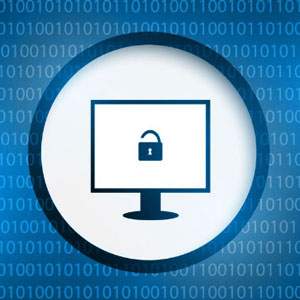Do your part. Be cyber smart.
You’re accessing archived content
This is archived content from the UIT website. Information may be outdated, and links may no longer function. Please contact stratcomm@it.utah.edu if you have any questions about archived content.
October is Cybersecurity Awareness Month.
 The line between our online and offline lives is indistinguishable — now more than
ever. While this network of connections creates opportunities for individuals and
organizations across the globe, it also comes with unique challenges.
The line between our online and offline lives is indistinguishable — now more than
ever. While this network of connections creates opportunities for individuals and
organizations across the globe, it also comes with unique challenges.
That’s why University Information Technology (UIT), for the seventh year, is participating in Cybersecurity Awareness Month (CSAM). The annual initiative — sponsored by the Department of Homeland Security and National Cyber Security Alliance — ensures that people have the resources they need to stay safer and more secure online. For the second year, the University of Utah has been designated a CSAM Champion.
This year's theme is "Do your part. Be cyber smart."
This October, UIT's Information Security Office (ISO) will highlight the ways in which internet-connected devices have impacted our lives, as well as provide the information and resources to empower users to own their role in protecting their part of cyberspace.
If everyone does their part — implementing stronger security practices, raising community awareness, educating vulnerable audiences or training employees — our interconnected world will be safer and more resilient for everyone.
Creating a cybersecure workspace — at home
When you work at home, many of the information security controls and procedures that the University of Utah has put in place to protect you no longer exist. However, you can take some simple steps to reduce the risk of an attack succeeding.
Why so many phishing attacks succeed
Phishing attacks can take many forms, but they all share a common goal — getting you to share sensitive information, such as login credentials, credit card information, or other restricted and/or sensitive data.
Meet ISO's computer forensics experts
Security Assessments Team Lead Dustin Udy and Senior Data Security Analyst Nate Remynse share a behind-the-scenes look at computer forensics — or the investigation of cybersecurity incidents — at the University of Utah.
8 simple tips to improve your online safety and security
Organizations and homes cannot be secure without each and every person doing their part. Online safety and security are a responsibility we all share. Here are some simple tips to help you get started.
Common scams —
and how to spot them
Criminals are constantly coming up with new schemes designed to compromise computers, steal passwords, trick you into revealing sensitive information, or con you out of money. They often use recent events — such as the COVID-19 pandemic — to prey on people, hoping to throw them off guard.
Weekly CSAM Scavenger Hunt
Each week in October, the U's Information Security Office (ISO) will post a new scavenger hunt question to go along with that week’s CSAM theme. Get the answer right and we’ll mail you a University of Utah cybersecurity decal (while supplies last).
Follow our partners on Twitter for more
Our partners will post all month about ways to do your part and #BeCyberSmart. Follow along for cybersecurity tips and resources from partner agencies, including the National Cyber Security Alliance and Cybersecurity and Infrastructure Security Agency.








